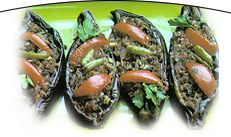Culinary Culture
 Nutritional habits are shaped according to the prevalent cultural - geographical - ecological - economic characteristics and features and the historical process.
Nutritional habits are shaped according to the prevalent cultural - geographical - ecological - economic characteristics and features and the historical process.
When one talks about the Turkish cuisine, the term should be understood as the totality of foods and beverages which provide nutrition to the people living in Türkiye, the ways of preparing and preserving them; techniques, equipment and utensils required for this, eating manners and all the practices and beliefs which are developed around this cuisine.
 The richness of variety Turkish cuisine possesses is due to several factors. In summary, the variety of products offered by the lands of Asia and Anatolia, interaction with numerous different cultures over a long historical process, the new tastes developed in the palace kitchens of the Seljuk and Ottoman empires have all played a part in shaping the new character of our culinary culture.
The richness of variety Turkish cuisine possesses is due to several factors. In summary, the variety of products offered by the lands of Asia and Anatolia, interaction with numerous different cultures over a long historical process, the new tastes developed in the palace kitchens of the Seljuk and Ottoman empires have all played a part in shaping the new character of our culinary culture.
Turkish Cuisine, which in general consists of sauced dishes prepared with cereals, various vegetables and some meat, soups, cold dishes cooked with olive oil, pastry dishes and dishes made from wild vegetation has also produced a series of health foods such as pekmez, yogurt, bulgur etc. The eating habits which reflect the tastes changing from one location to the next, gains a new meaning and near - sacredness on special occasions, celebrations and ceremonies.
Turkish Cuisine, while rich in variety and taste-bud friendly, also contains examples which could provide a source for healthy and balanced diets and vegetarian cuisines.